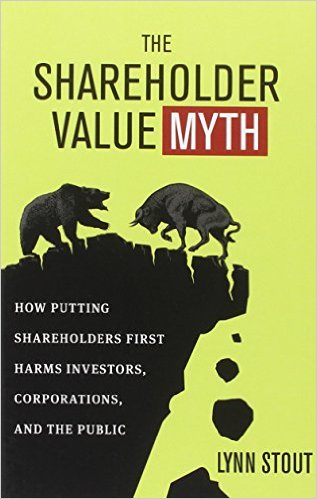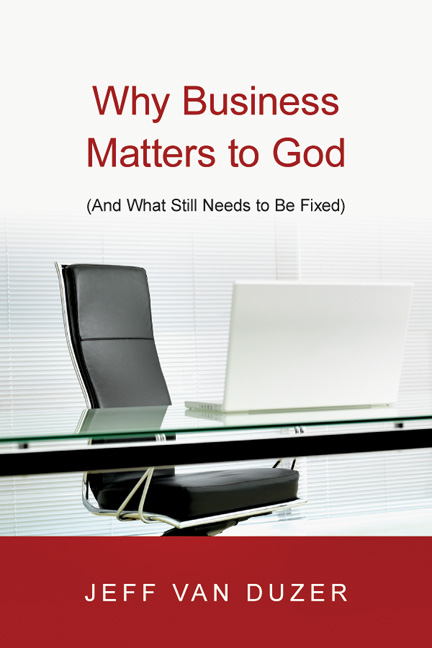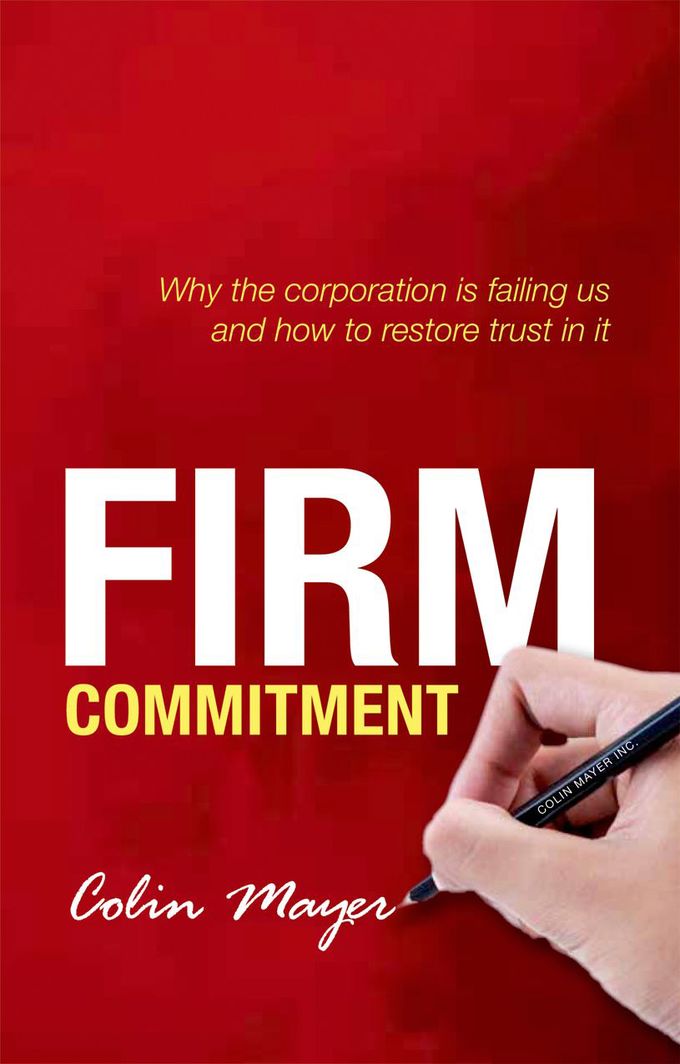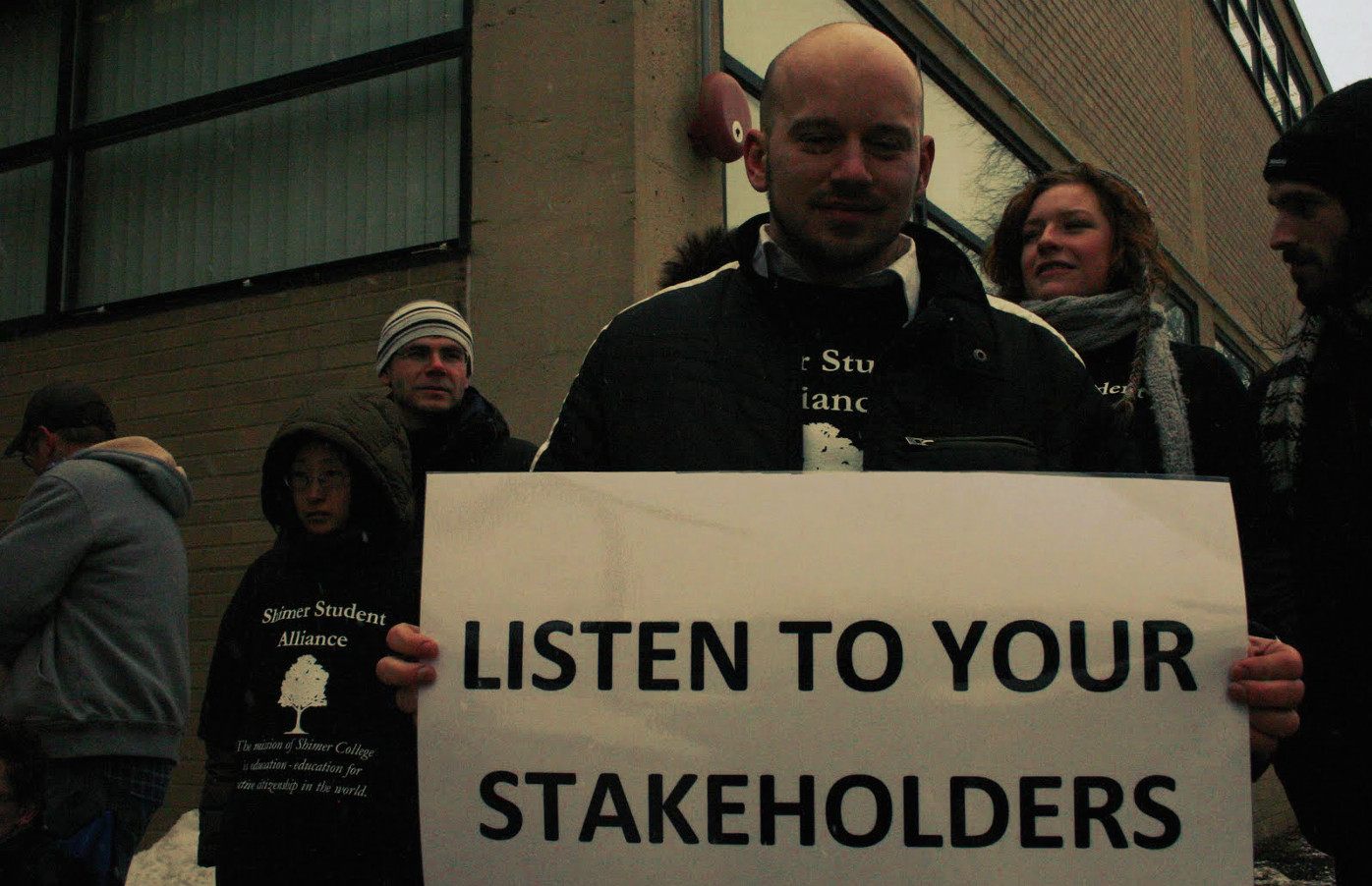
In 1987 ICI, one of the leading chemical conglomerates at the time, described its purpose as follows:
ICI aims to be the world’s leading chemical company serving customers internationally through the innovative and responsible application of chemistry and related science. Through the achievement of our aim we will enhance the wealth and well-being of shareholders, employees, customers, and communities which we serve and in which we operate.
In 1994 the company objective had changed to:
Our objective is to maximise value for our shareholders by focussing on businesses where we have market leadership, a technological edge, and a world competitive cost base.
So, what changed? What changed so that ICI no longer aimed to be the world’s leading chemical company? What changed such that ICI’s application of science was no longer to be the innovative and responsible application of chemistry and related science, but only that in which they had a technological edge? What happened to the employees, customers, and communities which we serve, to be replaced by to maximise value for our shareholders?
The answer requires a book rather than a blog but the case of ICI is illustrative of the way in which business has become separated from ethics, values and a truly holistic purpose which historically served the economy and society well.
The Quakers represented, in 1850, no more than one half a percent of the population. Thus it is even more extraordinary just how many of our household names had Quaker origins – not least in financial services – Barclays, Lloyds, Friends Provident, Cadbury, Rowntree, Clarks (as in shoes), Huntley and Palmer (biscuits). The successful iron smelting that formed the basis of the Industrial Revolution came from a Quaker family, the Darbys.
I am not suggesting that the solution to the problems of business purpose and intent today is solved if we all became Quakers! However, what I am saying is that by understanding the key reasons why the Quakers were successful (mostly) in business can inform our contemporary debates in a helpful manner.
There were four key reasons behind Quaker business success, all of which have wider application today.
Entrepreneurs do not flourish alone. Professor Mark Casson of Henley Business School has argued that the quality of entrepreneurship depends upon the quality of business culture. A strong culture is built upon trust, confidence integrity and quality. The strength of the Quaker culture had a direct impact upon their business success. The Quakers – among others – had by 1800 faced around 150 years of oppression, crucially including exclusion from the Universities. Hence many Quakers turned their minds to business. This persecution made them close-knit communities and it was within this setting that apprenticeships were developed, trust and confidence built as the major families all knew each other, with dishonesty and especially bankruptcy viewed in highly negative terms due to the impact on Quaker reputation. A strong culture which enhanced positive behaviour of honesty and integrity (quality products at fixed prices) and discouraged negative behaviour.
A major complexity today is that we have become so individualistic that moral behaviour is reduced also to the behaviour of each individual. We need to recover not ‘moralising’ but ‘moral character’ and ‘moral action.’ The reality is that much of the Quakers integrity derived from their spiritual principles. Their moral codes included injunctions against overtrading, honesty, payment of debts, caution over indebtedness, transparent and accurate accounts and understanding of the business. These principles derive from the Quaker ‘Advices’ and ‘Queries’ on trade issued between 1675 and 1793. Many Quakers became wealthy, but often had to endure the long and patient wait of the entrepreneur for success. As a result, they were not ostentatious with their wealth and certainly exercised personal discipline and frugality in the wait for a return. There are clear lessons for us today and we must become more willing to talk about moral values.
Generally speaking, negative views of business are aimed at the big corporates and more positive views of business related to smaller, local and family businesses (SMEs). All the successful Quaker businesses began as family businesses. Indeed, most involved the capital of the founders and owners being placed at risk. The opposite of limited liability. Growth inevitably led to a dilution of the family business and the need for capital ultimately led the leading Quaker businesses to adopt limited liability. However, the idea of the family business lay at the heart of the Quaker vision. The business was seen as part of the family and as a result concern for both quality products and the employees – so, everything from sport, to societies, savings clubs but also pension funds, sick pay and even bonus schemes.
The compartmentalisation of business from society is disastrous. The Quaker businesses had a much more holistic view of their purpose. Profitability was essential, but so were reputation, customers and the society of which they were part. The days of company’s building model villages providing housing – not charitable, but commercial – as well as ensuring community green space, fresh air and light may be over but the principles still provide lessons. Social purpose and commercial profitability and success are not mutually exclusive. Real relationships – between owners and managers, managers and workers, companies and customers and so on – are infinitely more purposeful than the remoteness and the contractual nature of so many business relationships.
How far we have come. Without a sense of ethical responsibility, disciplined moral behaviour and character and a recognition that capital and its economic return carry responsibilities as well as rewards, we will continue to increase the divide of business and society. However, we must also recognise that all of this can only be achieved in the context of a free economy where wealth creation is celebrated rather than despised and where the limits of government are recognised to be as significant as its regulatory and redistributive roles. A concern for society and the responsibilities of wealth do not need to be separated from a wealth-creating, efficient business enterprise. Profit is virtuous, but does not need to be maximised at the expense of all other demands.
Culture, ethics, family relationships, purpose, values, employees, responsibility – for all these things we can thank, at least in part, the Quaker businesses. All of those things are essential in restoring confidence in business today.
 Dr Richard Turnbull is the Director of the Centre for Enterprise, Markets & Ethics (CEME). For more information about Richard please click here.
Dr Richard Turnbull is the Director of the Centre for Enterprise, Markets & Ethics (CEME). For more information about Richard please click here.

Those who have studied modern technology based or enabled companies will doubtless consider Platform Capitalism to be superficial. Srnicek does not provide any worked through suggestions that will be useful either to the makers of public policy or to those involved in the management of business and many of his conclusions are contentious and appear to be based more on his prior left-wing accelerationist philosophical position than on the evidence presented in this book.
And yet: the book is interesting and thought provoking. Leaving aside the eccentric use (or, rather, minimal use) of paragraphing, Srnicek has an engaging style and presents a readable and helpful overview of the impact of technology on economic activity and of the strategy of technology companies. The book is short (l29 small pages) and can easily be read carefully in a couple of evenings. It is worth devoting this time to it.
Srnicek’s subject is the effect of digital technology on capitalism. He claims that “the platform” has emerged as a new business model and his aim is “to set these platforms in the context of a larger economic history, understand them as a means to generate profit, and outline some tendencies they produce as a result” (page 6). After a reasonably orthodox (if very obviously left-wing) review of economic and business trends since the 1970’s (primarily focussed on the USA and UK), he moves on to consider the emergence of “platforms”, which he defines as “digital infrastructures that enable two or more groups to interact” (page 43). He distinguishes five types of these: advertising platforms (e.g. the Google search engine), which allow their owners to extract information on users, undertake analysis, and use the product of this to sell advertising space; cloud platforms (e.g. Amazon Web Services), which comprise hardware and software that is rented out to digital-dependent businesses; industrial platforms (e.g. that of GE), which comprise the hardware and software necessary to transform traditional manufacturing; product platforms (e.g. that of Rolls Royce), which transform a traditional good into a service; and lean platforms (e.g. that of Uber), which are like product platforms but whose owners attempt to reduce their ownership of assets to a minimum.
The analysis of each of these business models is much the most interesting part of Platform Capitalism. Srnicek concludes, perhaps surprisingly, that lean platforms “seem likely to fall apart in coming years” (page 88) but he recognises that the other types of platform are here to stay. He sees some benefits in this (e.g. better products for customers) but his main focus is on the concerns to which the emergence of platforms gives rise.
His biggest concern is the perceived monopolistic tendency of platform capitalism. He returns to this on a number of occasions and asks “Will competition survive in the digital era, or are we headed for a new monopoly capitalism?” (page 94). This is certainly a question that needs to be addressed but, Srnicek’s analysis points to various factors that suggest that there will continue to be significant competition among the platform providers. Nonetheless, his prognosis is bleak. “Let us be clear,” he says, “this is ….. the concentration of ownership” and, he continues, “Far from being mere owners of information, these companies are becoming owners of the infrastructures of society” (page 92). This is surely unduly apocalyptic.
Srnicek’s other major concern relates to labour. It is here that his left-wing philosophy is most apparent. He points to some real concerns (e.g. the mis-labelling of employees as independent contractors with a view to avoiding employment protections) and he dismisses the absurd idea that user-created data comprises the exploiting of free labour. However, he makes many statements that rely on assumptions that are at best dubious. For example, his suggestion that “In a healthy economy [people such as Uber drivers] would have no need to be micro-tasking, as they would have proper jobs” (page 82) seems to be based on the assumption that the job market of, perhaps, 50 to 70 years ago is the only acceptable model and smacks of left-wing nostalgia for the days of manufacturing-based factory capitalism. Likewise, his suggestion that companies such as Airbnb have “off-loaded costs from their balance sheet and shifted them to their workers” (page 83) suggests preference for the rigidities of integrated corporate monoliths over the more flexible models permitted by modern technology.
The book also suffers in some places from loose use of terminology. For example, Srnicek several times mentions (with apparent disapproval) the “cross-subsidisation” that he believes is inherent in some platform business models (e.g. Googles) that involve providing a free service that enables advertising space to be sold. This use of the term is eccentric. Google is no more involved in cross-subsidisation than are the owners of commercial television stations or free local newspapers that have historically survived by selling advertising space. It is hard to see what is wrong with the Google “cross-subsidisation” model from a competitive or any other point of view.
More seriously, Srnicek’s frequent attacks on “tax evasion” are mis-directed. Many people are rightly concerned about tax evasion but he confuses illegal evasion with legitimate tax minimisation. In particular, he seems unaware that, pursuant to express US law, US corporations may legally avoid the payment of US tax on foreign profits for so long as these are not repatriated. He may not like the relevant US legislation but there is logic behind it and, in any event, companies can hardly be criticised for making use of it. His statement that “The leaders of tax evasion have …… been tech companies” (page 59) followed by a list of well-known names, without any supporting evidence, is both disturbing and disappointing.
The final section of the book (relating to what the future may hold) is less disturbing but equally disappointing. One idea is piled on another. In less than two pages, there are suggestions of: co-operative platforms; anti-trust action; regulation of, or even the banning of, lean platforms; co-ordinated action on tax; the creation of “platforms owned and controlled by the people”, which must nonetheless be “independent of the surveillance State apparatus”; “post capitalist platforms” (whatever they might be); and the collectivisation of platforms (pages 127/8). None of these ideas is explored and one may doubt the realism of at least some of them and the practical benefits of others.
This is a pity because there are many issues arising from “platform capitalism” that should be explored by both policy makers and those involved in business. What are the implications for privacy and, indeed, personal freedom and how should we respond to these? What kind of protections for “workers” are practicable and appropriate in a digital world? Where do the responsibilities of the platform companies to employees, customers, suppliers and others begin and end and how can they best discharge them? What kinds of regulatory regimes (if any) are needed for this kind of company and how can they be imposed in a digital, cross-border world? Generally, what does responsible digital business look like?
Srnicek fails to offer any insights into these matters. None-the-less, his analysis of the platform companies is important because it should help others to do so. It should also help all of us to note the way in which the business world is moving and avoid suggesting outdated solutions to modern business problems.
“Platform Capitalism” was first published in 2017 by Polity Press (ISBN 1509504869, 9781509504862), 120pp.
 Richard Godden is a Lawyer and has been a Partner with Linklaters for over 25 years during which time he has advised on a wide range of transactions and issues in various parts of the world.
Richard Godden is a Lawyer and has been a Partner with Linklaters for over 25 years during which time he has advised on a wide range of transactions and issues in various parts of the world.
Richard’s experience includes his time as Secretary at the UK Takeover Panel and a secondment to Linklaters’ Hong Kong office. He also served as Global Head of Client Sectors, responsible for Linklaters’ industry sector groups, and was a member of the Global Executive Committee.

They often say ‘never to judge a book by its cover’, that initial external appearances can distort or even deceive the audience from the content that lies within. Well, the principle doesn’t apply here. Lynn Stout’s The Shareholder Value Myth attempts to achieve exactly what the title entails: a pure and straight forward critique of the belief that the ultimate purpose of business is to maximise shareholder value, which often dominates the field of business management.
Author Lynn Stout is Professor of Corporate & Business Law at the Cornell Law School where her main areas of research include corporate law, securities and derivatives regulation, economics, and organisational behaviour. Stout argues that the Shareholder Value ideology is ultimately just an ideology, not a legal requirement or a ‘practical necessity of modern-day business life’ (p3). In this sense, Shareholder Value thinking is a mistake for most companies because it indirectly forces corporate managers and executives to ‘myopically’ focus on short-term earnings at the expense of long-term stability and performance. It also ‘discourages investment and innovation, harms employees, customers, and communities; and causes companies to indulge in reckless, sociopathic, and socially irresponsible behaviours’ (p10).
The book is written clearly and concisely, predominantly using direct rhetoric and short sentences. In terms of structure, the book is broadly divided in two comprising parts: Part 1 is a direct attempt in ‘Debunking the Shareholder Value Myth’ while Part 2 is mostly an investigative endeavour into who the ‘shareholders’ are and what they actually value. Each part is made up of five shorter Chapters so let’s take a closer look into some of the main points and arguments made throughout the book.
The first half can be seen as a systematic critique of the means and (even disastrous) consequences of ‘shareholder value thinking’. Corporate scandals such as the 2010 BP Oil Spill and cases of serious fraud in large companies such as Enron, HealthSouth and Worldcom throughout the 2000s are all cited as consequences of shareholder value thinking. Professor Stout makes a compelling case that the ‘narrow’ focus on share price alone can result in ruthless management behaviour. The drive for extreme cost-cutting in the hope of increasing short term profit doesn’t just hurt the employees and the company, but the shareholders themselves.
The book provides a brief historical account of how shareholder value thinking came to dominate teaching in business schools as well as becoming the norm within the private sector itself. If in the 1800s most privately held companies were of single ownership (or a tight shared ownership), by the 1990s publicly held companies have tens of thousands of shareholders. Stout rightly argues that this replacement of the ‘single’ ownership model with an executive Board to represent the vast number of shareholders causes the Board (as well as the senior management) to assume that all the shareholders want is ‘to make as much money as possible, as quickly as possible’. It rather quickly trickles down to the lowest common moral denominator, ignoring the fact that shareholders are real human beings with different investment timeframes, different priorities and different attitudes toward the well-being of others. In this sense Lynn Stout rightly argues that ‘recognising these differences reveals that the idea of a single objectively measurable “shareholder value” [i.e. solely based of share price] is not only quixotic, but intellectually incoherent’ (p60).
The second half of the book turns its attention toward the shareholders themselves: who are they? And what do they want to get out of their investment? These questions in turn give rise to a clear dichotomy within a company’s pool of shareholders: ‘short-term speculators versus long-term investors’. Again, Lynn Stout rightly points out that ‘long-term shareholders fear corporate myopia. Short-term investors embrace it – and many powerful shareholders today are short-term’ (p65). The conflict of interest generated by short vs. long-term investors indirectly forces a company’s management to take the default position and assume that every shareholder is a ‘platonic investor’ – i.e. an investor that only owns shares in company ‘X’ and the share price increase is all that they are interested in. Lynn Stout argues that in reality however, this ‘platonic investor’ does not exist. The overwhelming majority of investors today own more than just shares in company ‘X’, they are invested in the marketplace as a whole and want to protect the value of their other investments also. In this sense, the short-term focus generated by shareholder value thinking can actually work against the interests of the shareholders themselves.
The book as a whole presents a compelling critique of shareholder value thinking. Yet it’s strength is also its greatest weakness: it is just that, a critique –nothing more and nothing less. What are the solutions? The final pages of the book only tentatively touch on a possible way forward in arguing that what is needed is a more ‘complex and subtle understanding of what shareholders really want from corporations’ (p115). This all sounds great and very necessary but how do companies get there? Even if executives come to acknowledge the variations in their shareholder’s desires – is this a guarantee that the company’s approach to corporate governance will change?
I have written on this topic in the past where I highlighted the importance of first establishing a concrete set of internal ethical values and practices. Only then does it become possible to accommodate the desires of a larger pool of shareholders and indeed, stakeholders.
A great deal remains to be written on this topic and The Shareholder Value Myth by Lynn Stout is an excellent addition to the growing body of literature that forces us to re-think the role and purpose of business in society.
A recommended read.
“The Shareholder Value Myth” was published in 2012 by Berrett-Koehler Publishers (ISBN 10: 1605098132). 134pp.

Andrei Rogobete is Associate Director of the Centre for Enterprise, Markets & Ethics. For more information about Andrei please click here.

“Why Business Matters to God” is addressed to Christians. Jeff Van Duzer, now Provost of Seattle Pacific University and formerly Dean of its School of Business and Economics, suggests that Christians in business “have often been made to feel like second-class citizens in God’s kingdom” (page 9). His aim is to counter the attitudes that underlie this by affirming the intrinsic value of business work “as work full of meaning and importance to God”, whilst at the same time challenging what he describes as the “dominant business paradigm of the day” (page 9). The result is an excellent, well-argued and thought provoking book that should be read by all Christians engaged in business.
Van Duzer undertakes his task by using a theological framework, considering in successive chapters the implications for business of the biblical accounts of creation, fall, redemption and consummation.
From the creation story, he concludes that the material world matters to God, that human beings are called to steward God’s creation and that we are made to work (i.e. that work is not a punishment or a necessary evil). He notes that society has many institutions (e.g. families, churches and governmental bodies) and asks “which aspects of the creation mandate are best suited for business to handle?” (page 41). He points to the role of business in the creation of wealth and concludes that the intrinsic purposes of business are “to provide the community with goods and services that will enable it to flourish, and … to provide opportunities for meaningful work that will allow employees to express their God-given creativity” (page 42).
At this point, the reader may feel that the account of business is too rosy but this issue is squarely addressed in the next chapter, which considers the implications of the fall. Here Van Duzer parts company with the more extreme free market enthusiasts (both Christian and non-Christian) by stressing that “the market will not usher in the kingdom of God” (page 75) and suggesting that the market mechanism is an aspect of common grace that mitigates some of the consequences of the fall. He stresses that we cannot “equate market forces with God’s perfect will” (page 79).
Having done this, Van Duzer reverses the logical theological order and leaps on to consider what the biblical account of ultimate salvation (“consummation”) can teach us that is of relevance to business. In doing so, he heads into stormy theological waters as he assesses the relative merits of adoptionism and annihilationism as an explanation of how God’s new heaven and new earth will be inaugurated. He sides with the “cautious adopters” (page 94) but those who don’t take this view will be pleased to hear that it is not central to his argument and he acknowledges that “any conclusions we may reach must be held lightly” (page 83). This result is that this part of his analysis is less fruitful than other parts of it.
He next considers redemption and suggests that business must “concern itself with redemptive as well as creative work” (page 114), whilst accepting that it is operating within the “messy middle” (page 118). In this context, he rejects both the cynicism of those who suggest that “Business ethics is an oxymoron” and the optimism of those who argue that “Good ethics is good business” in the sense that there will always be a bottom line benefit for those practicing good ethics.
Van Duzer recognises that our attitude to business will turn to a considerable extent on our view of how Christians should engage with the world (what he calls our “posture of engagement”) and also upon our attitude to institutions of all kinds in the modern world. He devotes an “excursus” to each of these issues, of which the first is particularly helpful. It adopts Niebuhr’s typology (“Christ against culture”, “Christ of culture”, “Christ above culture”, “Christ and culture in paradox” and “Christ the transformer of culture”) and demonstrates how our answers to several key theological questions are likely to determine which type of cultural engagement we adopt and, specifically, our view of the role of business.
The final quarter of the book is less well structured than it might have been and parts of it would have better merged with the earlier chapters. None-the-less, it contains some worthwhile discussions of important issues such as business sustainability (in the broad sense) and, most importantly, the role of profit and enhancing shareholder value. Van Druzer recognises the essential instrumental role of profit but denies it any greater significance, specifically rejects the notion that the maximisation of profit or shareholder value is a primary goal of a business.
Although published under the IVP Academic banner, this is not an academic work. It does not interact extensively with other literature and it has no bibliography, although it makes good use of footnotes that may suggest further reading.
It is a short book and could not possible consider all of the angles on its subject. None-the-less, it would have been helpful had Van Duzer considered questions that arise from his dethroning of profit and shareholder value: Might this result in a loss of focus on efficiency and thus reduce wealth creation? How can managers be rendered accountable for the delivery of goals that cannot be quantified or otherwise clearly measured? If shareholders in a public company appoint and remove them, will the directors not always focus on the maximisation of shareholder value? Who might enforce any broader directors’ duties? Van Duzer is a lawyer by background and his views on these issues would be interesting.
Despite the final chapter’s focus on “making it real”, many readers may be left wondering how it is possible to translate Van Duzer’s vision of business into practice in a secular Western business context. This is a significant issue. However, the purpose of this book is to provide a Christian conceptual framework for business not to analyse in detail its implications in relation to day to day management. Addressing these implications would require another book and perhaps the only significant criticism that can be levelled at Van Duzer is that he hasn’t yet written it!
“Why Business Matters to God” was published in 2010 by InterVarsity Press (ISBN 10: 0830838880). 201pp.
 Richard Godden is a Lawyer and has been a Partner with Linklaters for over 25 years during which time he has advised on a wide range of transactions and issues in various parts of the world.
Richard Godden is a Lawyer and has been a Partner with Linklaters for over 25 years during which time he has advised on a wide range of transactions and issues in various parts of the world.
Richard’s experience includes his time as Secretary at the UK Takeover Panel and a secondment to Linklaters’ Hong Kong office. He also served as Global Head of Client Sectors, responsible for Linklaters’ industry sector groups, and was a member of the Global Executive Committee.

Colin Mayer is Professor of Management Studies at the Saïd Business School in Oxford. He believes that “the corporation is failing us” and that dramatic changes in the rights and obligations of those who control corporations are needed. Firm Commitment explains why and makes proposals for change.
Mayer uses the term “corporation” to refer to the kind of limited company that is commonly used by large businesses. He recognises the huge benefits that corporations have brought but he considers them to be seriously flawed. Indeed, he describes his book as “both a tribute to and a condemnation of this remarkable institution that has created more prosperity and misery than could have ever been imagined”. He perceives the main problem to be that corporations are seen as the creatures of their shareholders, rather than as independent entities, and this leads to the pursuit of shareholder value over the interests of stakeholders other than shareholders. In support of this, he cites numerous well-known corporate scandals.
The primary focus of his book is the UK and Mayer appears to believe the position here is worse than elsewhere. However, he is not starry eyed about any currently available option. Notably, he recognises that family and other tightly owned companies may have their own problems and scandals (citing Parmalat) and, in any event, family ownership “is not the resolution to the 21st–century corporation’s problems”. He is also dismissive of the attempts that have been made in recent years to correct problems through regulation (which, he asserts, “promotes immoral conduct”) or through enhanced corporate governance (which, he suggests, may promote increased shareholder control to the further detriment of other stakeholders). He suggests that what we need is “to find mechanisms by which companies can demonstrate a greater degree of responsibility themselves without relying on others to do it for them”. Specifically, he suggests that “we need to establish the means by which corporations can demonstrate more commitment to their stakeholder community”.
Salvation is in what he calls “trust firms”, which would be like existing corporations subject to three adaptations: entrenched within their constitutions would be corporate values (which might reflect the values of their founders, public policy or other things); there would be trustee boards to act as custodians of these values; and the corporation would have “time dependent shares” whereby the voting rights of shareholders would depend upon the extent of their commitment to hold their shares for the longer term (e.g. a share which its holder is committed to hold for a further ten years would have ten times the voting rights of a share which the holder is only committed to hold for one more year).
Mayer does not want any compulsion to be applied in relation to this. He argues that diversity in corporate forms should be permitted. He does, however, suggest that there be tax incentives to encourage the use of trust firms.
There is a lot to applaud in this book. In particular, there is depressingly little evidence that increased regulation or the focus on corporate governance in recent years has materially improved the corporate world and, against this background, Mayer’s stress on the importance of “commitment” as opposed to “control” deserves serious consideration. It links with ideas derived from the work on “relational thinking” that has been undertaken in recent years by, amongst others, the Relationships Foundation and Tomorrow’s Company. Furthermore, the concept of a “trust firm” is an interesting one that could contribute to the development of a broader view of corporate purpose and responsibility.
Unfortunately, however, this is a flawed book. Perhaps Mayer has tried to cram too much into 250 pages. Whatever the reason, almost every page contains contentious statements or statements that require significant qualification. Although there are plenty of footnotes referring to past research, there are also many ex cathedra statements as well as many assertions and assumptions with which specialists will take issue. For example, some of the statements of law are, at best, partial and Mayer seems unaware that much of what he proposes can already be achieved through existing law (as, for example, the entrenchment of editorial independence within the constitution of The Economist Newspaper Ltd illustrates). He also accepts dubious interpretations of past events. In particular, his long description of the Cadbury takeover accepts the views of its former chairman, Sir Roger Carr, without examination. This is a pity because others involved in that takeover (including former Cadbury directors) have different views and consideration of these might have led to Mayer modifying some of his suggestions.
More seriously, Mayer’s analysis of the objective of corporations is unhelpful. He states that “shareholder value is an outcome not an objective” and even quotes former GE CEO Jack Welsh in support of his views. However, his argument only addresses the use of short term share prices as the test of shareholder value and his suggested alternative as a corporate objective is demonstrably inadequate. He asserts that a corporation’s “first and foremost objective is not to its shareholders, or to its stakeholders. It is to make, develop, and deliver things and to service people, communities, and nations”. It is unclear from where he derives this overarching normative assertion and, in any event, it is no more useful than saying that the objective of corporations is “to do things”! It does not help a corporation’s management to decide whether they should remain in heavy engineering or move to IT or whether to be a volume manufacturer or a niche player.
Finally, Mayer’s evident confidence that the trust firm does not suffer from serious flaws and is the solution to the myriad of issues that he has identified is not backed-up by careful analysis. He appears to recognise this since he says that his ideas need to be “subject to careful scrutiny”. They certainly do and, whilst they are undoubtedly worth such scrutiny, it may be seriously doubted whether they are the “cure all” that Mayer appears to believe.
That said, provided that the book is read critically, it is well worth reading.
“Firm Commitment” by Colin Mayer was first published in 2012 by Oxford University Press (ISBN-10: 0199669937).
Richard Godden is a Lawyer and has been a Partner with Linklaters for over 25 years during which time he has advised on a wide range of transactions and issues in various parts of the world.
Richard’s experience includes his time as Secretary at the UK Takeover Panel and a secondment to Linklaters’ Hong Kong office. He also served as Global Head of Client Sectors, responsible for Linklaters’ industry sector groups, and was a member of the Global Executive Committee.

(This is an adaptation of a speech given at the Institute of Economic Affairs – For more information about the event please click here)
Christianity, politics the poor and the planet – what should the Christian attitude and response to these issues be?
I want to reflect on two things; the Christian responsibility for the environment and the role of the market in proving a mechanism for an appropriate response.
First, then, an appropriate Christian framework for dealing with environmental issues. It is an area where there is frequent muddled thinking. The Papal encyclical Laudato Si exemplifies both the basic principles and the muddle.
The doctrine of creation is paramount. It is the doctrine of creation which endows the human person with dignity. However, this same doctrine, drawn from Genesis 1 and 2, also establishes the principle of wealth creation. Man was placed in the Garden of Eden, we are told, to both work it (with the raw materials provided) – the principle of wealth creation, and to care for it – the principle of stewardship. To understand a Christian response to the environment you need both of those aspects, not just one.
Now, at the risk of getting too theological; since we live between the fall (hence not a perfect world) and the ultimate end (when all will be restored) there are trade-offs; we are to live, to work, to produce, to educate, to enjoy, to worship and we are to care, steward, oversee and act responsibly. We are not called to asceticism; Lydia is an example of a wealthy Christian businesswoman in the Bible; we are called to innovation, creativity and enterprise; and to steward and care for the world created by God.
The muddled thinking comes about because the language of ‘common good’ sometimes subverts the idea of ‘mutual flourishing.’ The latter bakes the cake; the former reflects upon its distribution. This also leads to the unhelpful presumption that government or global authorities provide the solution to every problem and there is frequently a misunderstanding of the market, which fails to give proper perspective to the role of business and enterprise
Second, then, how can the market help in the environmental debates? Four points:
The market is best at pricing and allocation. Certainly the market needs moral boundaries and moral people as participants and players. However, the market mechanism can be harnessed in support of the environment in ways that governments cannot achieve; governments invariably misallocate resources and hence excessive expectations of government are likely to harm rather than assist the environment.
Any Christian viewpoint that fails to give proper weight to wealth creation, to enterprise and to the market is, in my view, misrepresenting God.

Dr Richard Turnbull is the Director of the Centre for Enterprise, Markets & Ethics (CEME). For more information about Richard please click here.

First coined in 1984 by R. Edward Freeman in his book, Strategic Management: A Stakeholder Approach, Stakeholder Theory brought a new and somewhat radical approach to the study of organizational management and business ethics. Radical in the sense that it became the first theoretical framework to secure a prominent position for the interplay of values, responsibilities, and ethical decision-making in managing a business.
In contrast to the traditional shareholder view, stakeholder theory promotes a way of business conduct that takes into account all the parties that come into contact with a company’s ecosystem . From shareholders and employees, to customers, suppliers and the local community. A ‘stakeholder’ is a person or group that can affect or be affected by the business in question.
Here are three key lessons that we can learn from Freeman’s Stakeholder Theory:
- – Businesses that effectively manage all stakeholder relationships are more likely to succeed in the long-run.
- – Stakeholders must be considered together and not in isolation, working together in the same direction.
- – In the long-run, all stakeholders are equally important for the future of a business.
At the end of the day, both internal stakeholders (such as employees, management, shareholders) as well as external stakeholders (customers, the local community and even governmental or non-governmental organizations) – all have the power to significantly damage, and in extreme cases, bring down a business that mistreats them.
Wise companies must recognize the value in a stakeholder-driven management approach.

Andrei Rogobete is a Research Fellow with the Centre for Enterprise, Markets & Ethics. For more information about Andrei please click here.

CEME will be publishing a ‘theology of work’ in late 2015 so it was particularly helpful to listen to Yves de Talhouet, senior Vice-President of Hewlett-Packard on the subject.
Work is essential to human flourishing. All sorts of implications flow from that including for government welfare policies. However, work is not necessarily in the state it should be in. Gallup have shown that 16% of workers are actively disengaged from their work which has enormous cost in terms of productivity, community and the collective intelligence within a workplace.
Yves described work as under attack from two sources, both of which need to be resisted. The first is the classic ‘work is a necessary evil,’ or simply viewed as a prison to escape from. Actually work delivers well-being, defeats poverty and dependence and so needs to be encouraged. More interesting was Yves second point about work being under attack. In this case work was under attack from management systems driven only by numbers, productivity, targets etc, key performance indicators – all of which had the effect of disguising real work.
Work has three aspects:
A proper understanding of work involves all three of these aspects to be properly recognised. The problem is that the objective side (measurement, targets) has grown to the extent that nothing else seems to matter. Work is reduced to process and the consequence is disengagement. More value needs to be put into the subjective side (recognition, encouraging self-esteem) and the collective (team work, solidarity, community).
It seems to be me that we either over-emphasise the objective as Yves suggests so that we become obsessed by outputs and targets, or we ignore that productive side altogether in pursuit of some vague collective ideal. Work both dignifies humanity and is essential for producing goods and services. Work enables us to flourish and provide for our families. Work, for the Christian, reflects God’s purpose for us. Work is important.
If work is conveys both dignity and economic productivity then its lack destroys both. So unemployment is not a good thing and we should encourage policies which encourage enterprise, growth and hence employment. At least part of the purpose of a firm is to provide employment in the process of producing economic surplus. However, discouraging work also damages human dignity and purpose. CEME is strictly independent and works with people across the political spectrum. Nevertheless, if minimum wages are imposed at too high a level for all jobs, or welfare benefits set at too high a level, the consequence could be to discourage work. Equally, in order to encourage work there is surely a case for a degree of wage subsidy at the lowest points of the wage scale to encourage people into work. However, if tax credits potentially subsidise the proper wages employers should be paying then there is an even stronger case for a lower introductory rate of income tax which would encourage work, avoid subsidies and indeed the impact on take-home pay as income rises.
Whatever the policy prescriptions work not only must pay, but work must also be valued and invested with true worth, value and dignity in all its fullness.

Dr Richard Turnbull is the Director of the Centre for Enterprise, Markets & Ethics (CEME). For more information about Richard please click here.

I am passing through Rio de Janeiro en route to Belo Horizonte to attend the XXV World Congress of UNIAPAC (The International Christian Union of Business Executives) on the theme of “Business, Government and civil society working together for the common good.”
This is my first visit to South America and Rio has presented me with a capitalist conundrum.
What a great city. The beach at Copacabana is wonderful (well, it looks marvellous, I have not yet had opportunity to explore!). The setting, the mountains, the water, the statue of Christ the Redeemer are exceeded only by the friendliness of the people.
I know well that many cities and metro areas like Rio throughout the Americas and Africa present contrasts and poverty and wealth mingle together. My driver took me past large swathes of ‘shanty town’ like housing. It was not that I have never seen anything like it before (I have visited Cape Town in the past), but the capitalist conundrum struck me again.
The quality of the housing was shambolic. Half-built buildings, many exposed to the elements, seemingly built one on top of the other stretching back from the highway into the hilly areas behind. The conundrum is this. Almost all had satellite dishes and air-conditioning units. So on the one hand there seems to be poverty (at least as represented by poor housing) and on the other the poor exercising consumer choices in a capitalist economy that would reflect many more affluent priorities.
Are these apparently irreconcilable priorities reconcilable? Can capitalism provide a solution to the poverty of housing and indeed poverty more generally as well as providing such consumer choice?
Here are a few thoughts:
The problems which I think arise are when wages are so low they are unable to sustain the basic infrastructure (housing) yet provide some opportunity for consumer choice. I cannot believe how cheap the taxi fares are.
According to the Economist Brazil is in a hole and still digging. One of the largest economies in the world has seen GDP contract, deficits grow and government corruption is rife. A country the size of Brazil, of course, and in its regional setting, faces many difficulties of environmental issues, inclusion and so on. The 2016 Olympics is seeing significant infrastructure investment, though, once again, government corruption damages the inclusivity of the growth which is generated. All of these things are likely to enhance the capitalist conundrum rather than solve it.
Capitalism does lead to some unintended consequences. I am not one who believes that equality per se is necessarily a desirable objective; but poverty (in absolute terms) surely cannot be acceptable to any decent human being? Yet, a market economy built upon ethical principles can be the solution to many of these problems.
Capitalism generates conundrums. Long live capitalism. Oh, but take poverty seriously and let’s use our business and economic opportunities to help.

Dr Richard Turnbull is the Director of the Centre for Enterprise, Markets & Ethics (CEME). For more information about Richard please click here.

Are values and profitability incompatible?
Values have taken a central role in the debate about how private companies ought to conduct business in the post-recession era.
The idea that businesses should go beyond the narrow measures of shareholder value maximization and embrace a wider role of a ‘responsible citizen’ that cares about the society it operates in, is certainly not a new one. The 16th to 18th centuries saw the Quakers establish household brands such as Barclays, Lloyds, Cadbury and Rowntree. They were successful precisely because ethical behavior and a deep understanding of their responsibilities were the foundation of how they conducted business. Far from hindering profit, these companies understood that responsible behavior actually increased profitability (for more on Quakers in business, please see here). In the post-recession era, the idea of a values driven company (whether encompassed within traditional models such as Corporate Social Responsibility (CSR) or more recent development such as ‘B’ corporation certification) should therefore not be seen as simply an operational cost, or an add-on necessary only for PR purposes, but as a critical part of the long-term business plan.
But what exactly do we mean by Corporate Responsibility? Given the rather elusive nature of the concept we can easily find ourselves lost in the myriad of ideas that come to mind. However, CSR is effectively a management concept whereby companies integrate moral, social and environmental concerns in their business operations and interactions with stakeholders (adapted from the UN Industrial Development Organisation, 2015). By stakeholders we mean all actors that come into contact with the business itself, from internal stakeholders such as employees and owners, to external stakeholders such as customers, creditors, the government and so on. Ultimately, Corporate Social Responsibility is a business management strategy that holistically takes into account a company’s entire operational ecosystem.
From a more theoretical and rather traditional standpoint, one could argue that the odds are stacked against any significant CSR-related engagement. After all, it was Milton Friedman who famously claimed that “There is one and only one social responsibility of business — to use its resources and engage in activities designed to increase its profits so long as it stays within the rules of the game, which is to say, engages in open and free competition without deception or fraud.” (New York Times, 1970).
Most business schools around the world have adopted Friedman’s notions defining the purpose of enterprise solely in terms of ‘maximizing shareholder value’. We’ve heard this definition many times before and at least for the time being, it provides us with a clear purpose of what all private sector entities should ultimately be aiming for, i.e. making profit.
However, it is within this pursuit of profit that divisions begin to arise. The goal itself has an embedded sense of urgency that could (and has done in the past – prior to the financial crisis) compromise future returns in exchange for short-term gains. So at the very least the concern should be with long-term shareholder value. More importantly, how is shareholder value to be defined? Contrary to popular belief, Milton Friedman did believe that ‘CSR’-type expenditure such as local community investments, employee training or involvement in charitable activities are justifiable since they contribute to the long-run interests of a firm, whist also generating corporate goodwill (Hernandez-Murillo, 2014). It is therefore crucial that perception surrounding CSR or similar spending is changed from being seen as a cost, to an investment, a commitment to the medium and long-term goals of a company. Academics sometimes refer to this as ‘profit-maximising CSR’, whereby the firm’s ethically-driven activities are aligned with the firm’s self-interest (ibid). It ultimately leads to a win-win situation whereby both the firm, as well as the stakeholders gain from the strategy.
This leaves us with two questions that seek to answer CSR alignment on one hand, and real impact on the other. In other words: 1. Is the strategy aligned with the overall aims of the firm? And 2. Is it achieving the desired impact?
Nike, the shoe and sports clothing manufacturer is a perfect example of a CSR strategy that was not just limited to charitable donations or environmental issues, but was brilliantly in tune with the overall strategy of the firm.
Known as ‘NIKE +’, the company shifted its focus from promoting its products to helping its customers. “Instead of putting up another campaign of billboards with celebrities saying ‘buy our shoes’…NIKE + actually helps you become a better runner” (Levick, 2012). Through products such as the Nike FuelBand (a wristband which monitors your physical activity) and personalized customization through Nike iD, the firm is effectively trying to say “we care more about you and your personal fitness goals than we do about advertising our products”. This was a serious customer focused strategy which contributed – alongside the traditional CSR values type activity – to show the company strategically interested in aligning itself with the interests of its customers. Profitable too.
The result? Nike’s share price almost doubled over the last 24 months from $64 per share to $115 per share while its closes competitor Adidas, dropped from $84 to $64 over the same period of time. Of course, one could argue that there are other contributing factors to the success of Nike and apparent decline of Adidas, but the commitment and focus on a morally-guided strategy of placing the customer’s interests first have clearly paid off.
Values, corporate responsibility and profitability are not juxtaposed as alternatives – they are two parts of the whole. A concept such as CSR and its wide-ranging type of activities and approach to business should therefore not be seen as a cost, but a crucial part of the long-term business plan. As a strategy that holistically takes into account the entire business ecosystem and if aligned correctly, it can produce tremendous results indeed.
Andrei Rogobete is a Research Fellow with the Centre for Enterprise, Markets & Ethics. For more information about Andrei please click here.